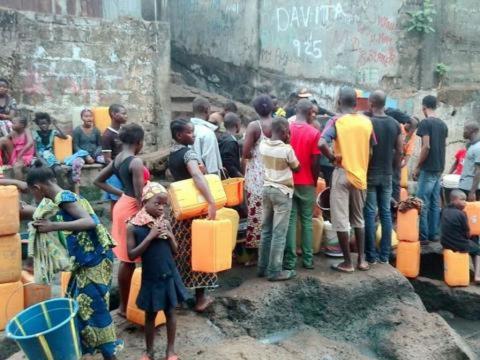By Mabinty M. Kamara
The Sierra Leone Water Company (SALWACO) must take its responsibility of water provision seriously because water is a human rights issue, the Human Rights Commission of Sierra Leone (HRCSL) has said.
Officials of the Commission are worried that difficulty in accessing water by many Sierra Leoneans has had far-reaching implications, amounting to violations of human rights.
Sierra Leone has two agencies that are charged with providing water to the population: SALWACO and the Guma Valley Water Company.
While Guma is responsible for providing water to residents of the capital city, Freetown, SALWACO is charged with providing the service to the rest of the country.
Both institutions have blamed various factors that include lack of resources and human activities on the environment for their inability to serve their purpose.
HRCSL recently engaged the two institutions in an effort to remind their managements of their mandate.
Victor Lansana, Vice-Chairperson of the Commission, told Politico that the move to engage SALWACO was part of the Commission’s mandate to engage with relevant institutions to ensure that human rights were protected in the discharge of their duty, stressing that the provision of safe drinking water was one of these rights.
“We thought it fit that SALWACO is one of those institutions we can engage. The work of SALWACO is human rights related as water supply is actually a human rights issue. In fact, it finds itself among the Economic Social and Cultural Rights (ECOSOC) and it is one of those progressive rights that we find in Part II of the Constitution of Sierra Leone,” Lansana said in an interview.
He added: “If water is not supplied, or access to water is not forthcoming, it means that several other rights such as health and education will be affected.”
Sierra Leoneans has long had an acute shortage of safe drinking water. The recurrent situation gets worst during the dry season. This has had various implications on the masses, particularly women and girls who are responsible to provide water for the family.
In a statement issued by HRCSL after the meeting with SALWACO on January 29th, its Director of Gender and Children’s Affairs, Gloria Bayoh, said the status quo affected women and children more than any other class of people.
Lansana, the Vice Chairperson, explained it in more detail to Politico.
“We have heard of the common parlance ‘water for water.’ So we have had several cases of teenage pregnancies as a result of water. That is why we believe that engaging SALWACO is the right thing to do because we want to explain to them that it is very much important that they treat their work seriously because at the end of the day, if they fail to discharge their responsibilities, many people will be affected and many more rights will be affected.”
SALWACO declined a request by Politico for a comment.
But the statement issued by the HRCSL cited the Company’s General Manager, Joseph Sandy, expressing gratitude for the engagement, lamenting that the institution was challenged with resources and energy which had affected the level of trust between it and its consumers.
SALWACO, with funding support from the African Development Bank and other co-funders, has been implementing the Three Towns Water Supply and Sanitation Project in the three districts of Makeni, Kenema and Bo since 2011.
The project, which involves the construction of pipe-borne water in the three major provincial districts, cost an estimated US$60million and it was billed to help improve the lives of citizens in that part of the country with the provision of reliable, clean and safe drinking water.
By 2016, the facilities in all three districts had been pre-commissioned. But since then, residents have been complaining about the unreliability of the water supply system, where it is available. For a vast majority of the masses, they still rely on wells and streams for drinking water.
Late last month residents of Bo complained of prolonged absence of water supply, which they said was crippling their businesses and general livelihoods. Residents who spoke to Politico said they had not got any a drop of water for three months.
Saffa Bockarie, Monitoring and Research Officer at SALWACO, told the meeting with the HRCSL that the company’s ability to supply water had been eroded by human settlements.
“Human invasion and deforestation makes it so much difficult as more resources are needed to make the water safe and drinkable,” Bockarie was quoted saying.








